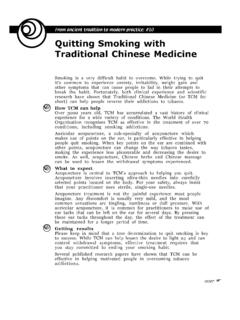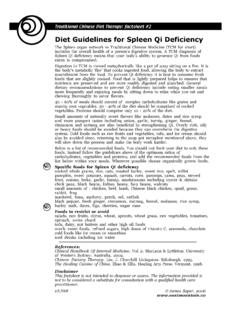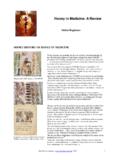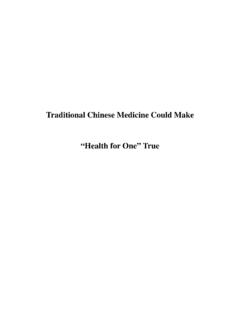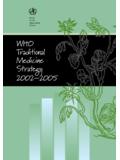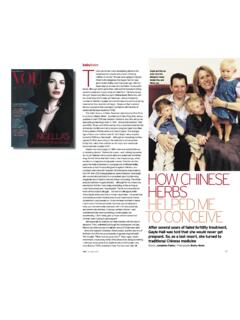Transcription of Diet Guidelines for Lung Qi Deficiency - eastmountain.ca
1 traditional chinese Diet Therapy: factsheet #7 Diet Guidelines for Lung Qi DeficiencyThe Lung organ network in traditional chinese medicine (TCM for short) along with the body s digestive system, is how a person takes in Qi to power our thoughts and actions. A TCM diagnosis of Lung Qi Deficiency means that your body s ability to generate and distribute Qi is prevent Qi Deficiency it is best to consume fresh foods that are slightly cooked. Food that is lightly prepared helps to ensures that nutrients are preserved and are more readily digested and absorbed. General dietary recommendations to prevent Qi Deficiency include eating smaller meals more frequently and enjoying meals by sitting down to relax while you eat and chewing thoroughly to savor flavors.
2 Meals should consist largely of easily digested complex carbohydrates like grains and starchy root vegetables. 30 - 40% of the diet should be comprised of cooked vegetables and proteins should comprise only 10 - 20% of the amounts of naturally sweet flavors like molasses, dates and rice syrup and more pungent tastes including onion, garlic, turnip, ginger, fennel, cinnamon and nutmeg are also beneficial in strengthening Qi. Overly rich, oily or heavy foods should be avoided because they can overwhelm the digestive system. Cold foods such as raw fruits and vegetables, tofu, and ice cream should also be is a list of recommended foods. You should not limit your diet to only these foods. Instead follow the Guidelines above of the optimum ratios of carbohydrates, vegetables and proteins, and add the recommended foods from the list below within your meals.
3 Wherever possible choose organically grown foods for Lung Qi deficiencycooked whole grains, glutinous rice, oats, roasted barley, sweet rice, speltpumpkin, potatoes, sweet potatoes, taro root, squash, carrots, corn, parsnips, yams, peas, stewed fruit, onions, leeks, garlic, turnip, shitake mushrooms, oyster mushrooms, daikon rootchick peas, black beans, walnutschicken, chinese black chicken, beef, lamb, quail, goose, rabbitmackerel, tuna, anchovyblack pepper, fresh ginger, cinnamon, nutmeg, fennel, molasses, rice syrup, barley malt, dates, figs, honeyFoods to restrict or avoidsalads, raw fruits, citrus, wheat, sprouts, wheat grass, raw vegetables, tomatoes, spinach, swiss chardtofu, dairy, nut butters and other high oil foodsoverly sweet foods, refined sugars, high doses of vitamin C, seaweeds, chocolatecold foods like ice cream or smoothiesiced drinks including ice water, strong tea, wineReferences:Clinical Handbook Of Internal medicine , Vol.
4 2. MacLean & Lyttleton. University of Western Sydney: Australia. Dietary Therapy. Liu, J. Churchill Livingston: Edinburgh. Healing Cuisine of China. Zhao & Ellis. Healing Arts Press: Vermont. factsheet is not intended to diagnose or assess. The information provided is not to be considered a substitute for consultation with a qualified health care James Saper.
